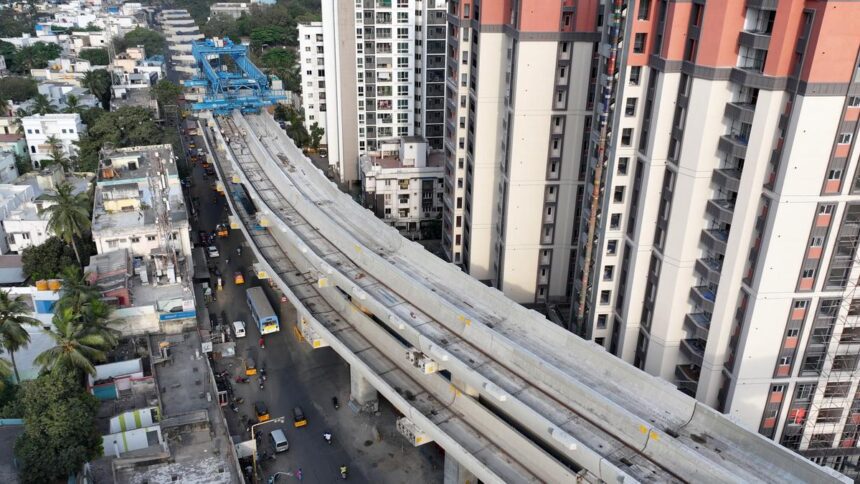In light of the swift economic advancement and urban development in Tamil Nadu, the state government is assessing the viability of launching a Regional Rapid Transit System (RRTS) across three designated routes. This initiative draws inspiration from the Semi High-Speed Railway (SHR) model operating between New Delhi and Meerut.
The Chennai Metro Rail Corporation has been tasked with conducting thorough feasibility studies to implement an SHR system capable of reaching speeds of 160 km/h along the following stretches: Chennai–Chengalpattu–Tindivanam–Villupuram (167 km), Chennai–Kanchipuram–Vellore (140 km), and Coimbatore–Tiruppur–Erode–Salem (185 km). This announcement was made by State Finance Minister Thangam Thennarasu during the Tamil Nadu Budget 2025-26 presentation.
Regarding the metro rail development, the minister highlighted that Phase-II of the Chennai Metro is the largest metro project currently underway in India, with a financial outlay of ₹63,246 crore and an overall length of 119 km spanning three corridors. Construction is progressing swiftly, with the elevated segment between Poonamallee and Porur set to open for public access in December of this year.
Detailed project reports (DPRs) have been prepared for metro rail initiatives along Avinashi Road and Sathyamangalam Road in Coimbatore, projected to cost ₹10,740 crore, as well as for the Thirumangalam–Othakadai corridor in Madurai, expected to cost ₹11,368 crore. These DPRs have been submitted to the Union Government for potential equity support, and construction is anticipated to commence upon receiving approval.
Moreover, Detailed Project Reports have been prepared for extending the Chennai Airport metro line to the Kalaignar Centenary Bus Terminus in Kilambakkam (15.46 km, ₹9,335 crore), for extending the Koyambedu metro line to Pattabiram via Avadi (21.76 km, ₹9,744 crore), and for a 27.9 km extension from Poonamallee to Sunguvarchatram via Sriperumbudur (₹8,779 crore). These reports will also be submitted to the Union Government for their contribution to equity financing.
Additional DPRs will be developed for transit routes between Tambaram and Velachery via Guindy (21 km) and from Lighthouse to High Court (6 km), as noted by the minister.
The Chennai Metro Rail Corporation will also explore the feasibility of establishing high-altitude transport systems, such as ropeways, in tourist locations like Mamallapuram, Udhagamandalam, and Kodaikanal. This effort is aimed at boosting tourism while taking into account the delicate micro-environmental ecosystems of these areas, according to the minister’s statements.
To enhance tourist traffic and foster development in economically disadvantaged regions of South Tamil Nadu, a new airport is slated for construction in the Rameshwaram area of Ramanathapuram district.
The state government has secured lands worth ₹2,938 crore for the Airports Authority of India to facilitate the expansion of airports in Chennai, Coimbatore, Madurai, Trichy, and Thoothukudi. Furthermore, land acquisition totaling ₹350 crore is in process for the Salem airport, and efforts are also underway to expedite the development of a new Greenfield airport at Paranthur, near Chennai, the minister remarked.
To combat air pollution and minimize carbon emissions, 700 diesel buses operated by the State Transport Corporations will be converted to Compressed Natural Gas (CNG) buses at an expense of ₹70 crore, with funding from the Tamil Nadu Pollution Control Board.
The government is committed to ensuring that consistent and reliable transportation services remain accessible, even in the most underserved villages of Tamil Nadu. To support this initiative, ₹1,031 crore has been earmarked in the upcoming financial year for the introduction of 3,000 new buses. Additionally, 750 existing buses with operational chassis will undergo refurbishment at an anticipated cost of ₹120 crore.
To mitigate air pollution in urban areas and enhance the environment, a deployment of 1,125 electric buses is planned, including 950 for Chennai, 75 for Coimbatore, and 100 for Madurai. This deployment is set to commence this year, supported by loans from the World Bank and the German Development Bank (KfW).
With rising urbanization, transport terminals that integrate bus, suburban railway, and metro services are increasingly vital. In this context, a multimodal transport terminal is planned for Guindy, with an estimated cost of ₹50 crore, featuring modern amenities that connect these transport modes. Additionally, another terminal will be developed in Washermanpet, Chennai, also with an estimated budget of ₹50 crore.
To improve operational efficiency, service delivery, and the financial health of State Transport Undertakings (STUs), an incentive fund of ₹2,000 crore will be established in the upcoming financial year to offer performance-linked incentives to STUs. Further, ₹646 crore will be allocated as Operational Viability Gap Funding under the Chennai City Partnership Programme to bolster service efficiency in the Metropolitan Transport Corporation.
This year’s budget includes allocations of ₹3,600 crore for the Vidiyal Payanam Scheme, ₹1,782 crore for subsidized bus fares for students, and ₹1,857 crore for diesel subsidies. A total of ₹12,964 crore has been assigned for the Transport Department, as stated by the minister.










